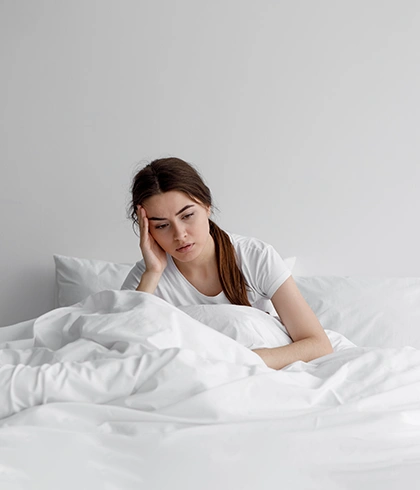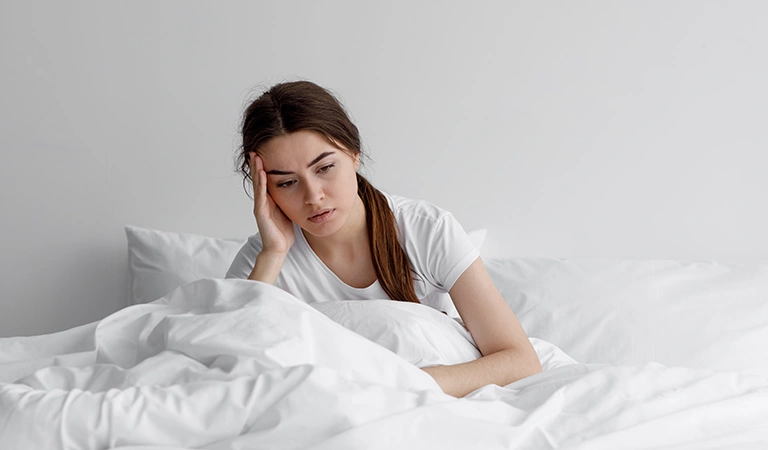

Migraine and Sleep: Importance of Quality Sleep for Prevention
Sleep Smarter: How to Beat Migraines and Get the Rest You Deserve!
Are you tired of waking up feeling like you've been hit by a truck? Do migraines ruin your day before it even starts? It's time to take control of your sleep and conquer those migraines once and for all! In this guide, we'll explore how you can sleep smarter to not only beat migraines but also get the rest you truly deserve. Say goodbye to sleepless nights and hello to waking up refreshed and ready to tackle the day!
What Exactly are Migraines?
Migraines are neurological conditions characterized by recurrent, intense headaches often accompanied by other symptoms. These symptoms can include throbbing or pulsating pain, sensitivity to light, sound, or smells, nausea, vomiting, and visual disturbances like aura (flashes of light, blind spots). Migraines can be extremely debilitating, often causing significant disruption to daily activities and lasting anywhere from a few hours to several days. They can vary in frequency and severity among individuals.
Sleep is crucial and helps regulate neurotransmitters and hormones involved in pain modulation, such as serotonin and cortisol. Disruptions in sleep patterns or insufficient sleep can lead to imbalances in these chemicals, potentially triggering migraines or exacerbating existing symptoms.
Establishing a regular sleep schedule, practicing good sleep hygiene, and creating a comfortable sleep environment are essential steps in managing migraines. By prioritizing quality sleep, individuals can support their overall health and improve their ability to cope with and prevent migraine attacks.
The Migraine-Sleep Connection
The relationship between migraines and sleep disturbances is well-documented, with each often exacerbating the other. Individuals suffering from migraines are prone to experiencing sleep problems, while sleep issues can also serve as triggers for migraines.
- Insufficient Sleep: Research indicates that a lack of adequate sleep is a common precursor to migraines. Studies have revealed that poor sleep quality significantly heightens the risk of migraines. For instance, a study published in the Journal of Headache and Pain found a direct correlation between subpar sleep patterns and increased susceptibility to migraines.
- Oversleeping: Interestingly, excessive sleep can also act as a trigger for migraines in certain individuals. Engaging in weekend sleep-ins or prolonged periods of sleep on days off can disrupt one's regular sleep schedule, consequently precipitating migraines. This disruption mimics the effects of insufficient sleep and can similarly provoke migraine episodes.
- Sleep Disorders: Individuals afflicted with migraines are more prone to various sleep disorders, including insomnia, sleep apnea, and restless legs syndrome. These conditions disrupt the quality of sleep and exacerbate migraine symptoms. The coexistence of migraines and sleep disorders underscores the intricate interplay between sleep patterns and migraine pathophysiology.
How Homeopathy and Improved Sleep Can Help with Migraines
Homeopathy takes a comprehensive approach to addressing migraines by focusing on the underlying causes and promoting overall well-being. Here's how homeopathy works to reduce sensitivity to triggers, including sleep disturbances, and emphasizes the importance of improving sleep quality:
- Holistic Assessment: Homeopathy doctors evaluate physical, emotional, and mental states to identify migraine triggers like stress, hormones, diet, and sleep issues.
- Safe and Gentle: Homeopathic migraine remedies are safe for all ages, including pregnant women and children, without harmful side effects, offering long-term use alongside conventional migraine headache treatments.
- Individualized Treatment: Tailored migraine remedies stimulate the body's healing response, addressing root causes for long-term relief and prevention.
- Reducing Trigger Sensitivity: Migraine remedies lessen sensitivity to triggers like sleep disturbances, promoting relaxation and resilience to stressors.
- Lifestyle Changes: Homeopathy advocates lifestyle modifications such as consistent sleep schedules, stress reduction, balanced diet, and physical activity for holistic healing.
- Promoting Well-being: By enhancing overall health and resilience, homeopathy reduces susceptibility to migraines and improves sleep quality, supporting the body's natural defenses.
Homeopathic Support for Better Sleep
Homeopathy offers a holistic approach to addressing sleep disturbances by targeting the underlying causes such as stress, anxiety, and restlessness. there are many homeopathic migraine remedies that may help regulate sleep patterns and alleviate related symptoms:
Note: It's important to consult with a qualified homeopathic doctor to determine the most appropriate remedy based on individual symptoms and constitution. Additionally, lifestyle changes such as maintaining a consistent sleep schedule, practicing relaxation techniques, and creating a conducive sleep environment can complement homeopathic migraine treatments for better sleep regulation.
Migraine Headache Treatment At Dr Batra’s
At Dr. Batra's, we offer comprehensive treatment for migraine headaches with a track record of success. With over 5000 + migraine patients treated and an amazing success rate, we take a personalized approach to each case.
Our expert homeopathy doctors delve into various aspects of the patient's life, including stressors such as emotional disturbances, financial worries, work-related issues, and familial or relationship problems. By understanding how these stressors contribute to migraine attacks, we create customized migraine treatment tailored to each individual.
Dr. Batra's migraine homeopathic treatment aims to regulate emotional sensitivity, reduce the intensity, frequency, and duration of headaches, and ultimately diminish the tendency for migraines. Our approach addresses deep-seated emotions like anger and sadness, which may act as triggers for migraines. Additionally, our migraine headache treatment enhances the patient's ability to cope with stress, improves overall health, and enhances quality of life.
Lifestyle Strategies & Homeopathy for Optimal Sleep
Good sleep hygiene is crucial for maintaining optimal sleep patterns and overall well-being. Establishing a regular sleep schedule and engaging in relaxing bedtime routines are foundational components of good sleep hygiene. Here's how incorporating lifestyle strategies alongside migraine homeopathic treatment can provide deeper support for achieving restful sleep:
- Regular Sleep Schedule: Maintain a consistent bedtime and wake-up time.
- Relaxing Bedtime Routine: Wind down with calming activities before sleep.
- Conducive Sleep Environment: Keep the bedroom dark, cool, and quiet.
- Stress Management: Practice relaxation techniques like mindfulness or deep breathing.
- Healthy Lifestyle Habits: Eat a balanced diet, exercise regularly, and limit caffeine and electronics before bedtime.
- Homeopathic Migraine Treatment: Consult with a homeopathy doctor for personalized migraine homeopathic treatment targeting specific sleep issues like anxiety or restlessness.
When to Seek Professional Help
It's important to seek professional help for migraines if you experience any of the following:
- Frequent or severe headaches: If your migraines are occurring frequently or the pain is severe and interfering with your daily activities, it's a good idea to consult a healthcare professional.
- New or different symptoms: If you start experiencing new or different symptoms along with your migraines, such as weakness, numbness, vision changes, or difficulty speaking, it could indicate a more serious underlying issue that requires medical attention.
- Medication overuse: If you find yourself relying on over-the-counter or prescription migraine medications too frequently to manage your migraines, it's time to consult a healthcare provider. Overuse of certain migraine medications can lead to migraine medication-overuse headaches, which can be difficult to treat.
- Migraines that worsen over time: If your migraines are becoming more frequent, severe, or long-lasting over time, it's important to see a healthcare professional to rule out any underlying causes or to adjust your migraine headache treatment accordingly.
- Impact on quality of life: If migraines are significantly impacting your quality of life, causing you to miss work, and social activities, or affecting your relationships, it's essential to seek help. A healthcare provider can work with you to develop a comprehensive migraine treatment to better manage your migraines and improve your quality of life.
- Other medical conditions: If you have other medical conditions or risk factors that could complicate the management of migraines, such as high blood pressure, heart disease, or pregnancy, it's important to consult a healthcare professional for personalized advice and a cure for migraine headaches.
Migraines can profoundly disrupt daily life, but seeking professional help can provide relief and improve overall well-being. Whether experiencing frequent headaches, new symptoms, medication overuse, worsening migraines, quality of life impact, or concurrent medical conditions, consulting a healthcare professional is vital for effective migraine management. prioritizing your health is crucial, and seeking timely assistance can lead to better outcomes in managing migraines.
Sources:



